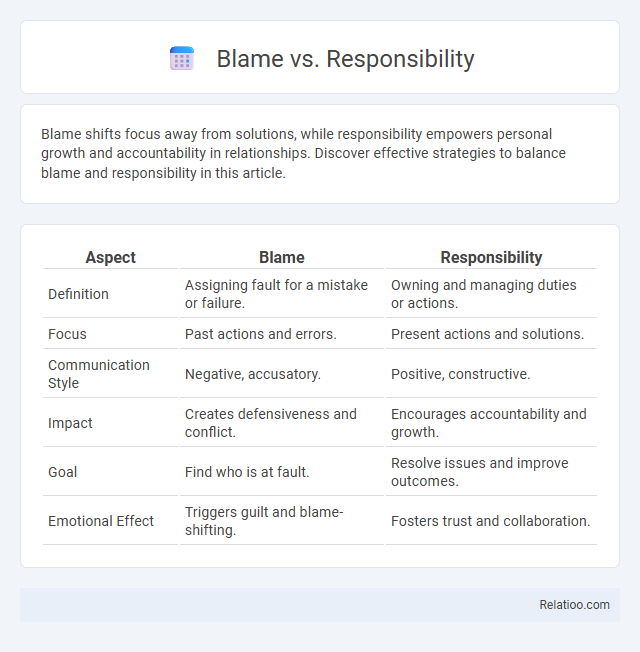Blame shifts focus away from solutions, while responsibility empowers personal growth and accountability in relationships. Discover effective strategies to balance blame and responsibility in this article.
Table of Comparison
| Aspect | Blame | Responsibility |
|---|---|---|
| Definition | Assigning fault for a mistake or failure. | Owning and managing duties or actions. |
| Focus | Past actions and errors. | Present actions and solutions. |
| Communication Style | Negative, accusatory. | Positive, constructive. |
| Impact | Creates defensiveness and conflict. | Encourages accountability and growth. |
| Goal | Find who is at fault. | Resolve issues and improve outcomes. |
| Emotional Effect | Triggers guilt and blame-shifting. | Fosters trust and collaboration. |
Understanding the Concepts: Blame vs Responsibility
Blame assigns fault for a negative outcome, often focusing on past actions and emotional judgment, while responsibility emphasizes accountability for current and future actions without assigning guilt. Understanding the distinction helps you approach challenges with a solution-oriented mindset, promoting growth and effective problem-solving. Recognizing responsibility encourages proactive behavior, whereas blame can hinder progress by fostering defensiveness.
The Psychological Impact of Blame
Blame often triggers feelings of shame, guilt, and defensiveness, which can hinder personal growth and damage relationships. Responsibility, by contrast, promotes accountability and empowerment, enabling individuals to learn from mistakes without the negative emotional burden. Understanding the psychological distinction between blame and responsibility helps foster resilience and healthier emotional regulation.
Responsibility: Empowerment and Growth
Responsibility empowers you to take control of your actions and decisions, fostering personal growth and accountability. Unlike blame, which shifts focus to fault and negativity, responsibility encourages proactive problem-solving and constructive reflection. Embracing responsibility enables continuous improvement and strengthens your capacity to influence positive outcomes in both personal and professional contexts.
Origins of Blame in Human Behavior
The origins of blame in human behavior stem from evolutionary mechanisms designed to promote social cohesion and cooperation by identifying individuals responsible for negative outcomes. Blame functions as a social tool to assign responsibility, enforce accountability, and discourage harmful actions within groups. This adaptive process has been shaped by cognitive and emotional factors that influence how humans perceive and react to others' behavior in social contexts.
How Responsibility Fosters Accountability
Responsibility creates a foundation for accountability by encouraging ownership over actions and outcomes, unlike blame which often leads to defensiveness and avoidance. When you accept responsibility, it promotes transparency and proactive problem-solving, essential for personal and organizational growth. Emphasizing responsibility over blame cultivates trust and a collaborative environment where individuals feel empowered to improve and succeed.
The Detrimental Effects of Blame Culture
Blame culture fosters a toxic environment where fear of criticism inhibits innovation and personal growth. Your ability to take responsibility diminishes as individuals focus on assigning fault rather than solving problems. Emphasizing accountability over blame enhances collaboration, improves team morale, and drives sustainable success.
Shifting Mindset: Embracing Responsibility
Shifting mindset from blame to responsibility fosters personal growth and accountability by encouraging proactive problem-solving instead of dwelling on fault. Embracing responsibility involves acknowledging one's role in outcomes and focusing on actionable steps to improve situations. This shift enhances emotional resilience and promotes constructive communication in both personal and professional relationships.
Practical Steps to Move from Blame to Responsibility
Shifting from blame to responsibility involves acknowledging personal roles in challenges without assigning fault to others, fostering accountability and proactive problem-solving. Practical steps include practicing self-reflection to identify one's contributions, communicating openly to understand different perspectives, and setting actionable goals to remedy issues collaboratively. Emphasizing responsibility over blame creates a constructive environment that encourages growth and effective conflict resolution.
Blame vs Responsibility in Relationships and Work
Blame in relationships and work often focuses on assigning fault for mistakes, which can create defensiveness and hinder problem-solving, whereas responsibility emphasizes accountability and proactive steps to address issues. Taking responsibility fosters trust and collaboration by encouraging individuals to acknowledge their roles and contribute to solutions without judgment. Distinguishing between blame and responsibility promotes healthier communication and more effective conflict resolution in both personal and professional environments.
Building a Culture of Responsibility
Building a culture of responsibility requires distinguishing between blame and accountability, emphasizing learning and growth rather than punishment. Encouraging open communication and shared ownership of outcomes fosters trust and improves overall team performance. Organizations that prioritize responsibility over blame see enhanced collaboration, innovation, and long-term success.

Infographic: Blame vs Responsibility
 relatioo.com
relatioo.com